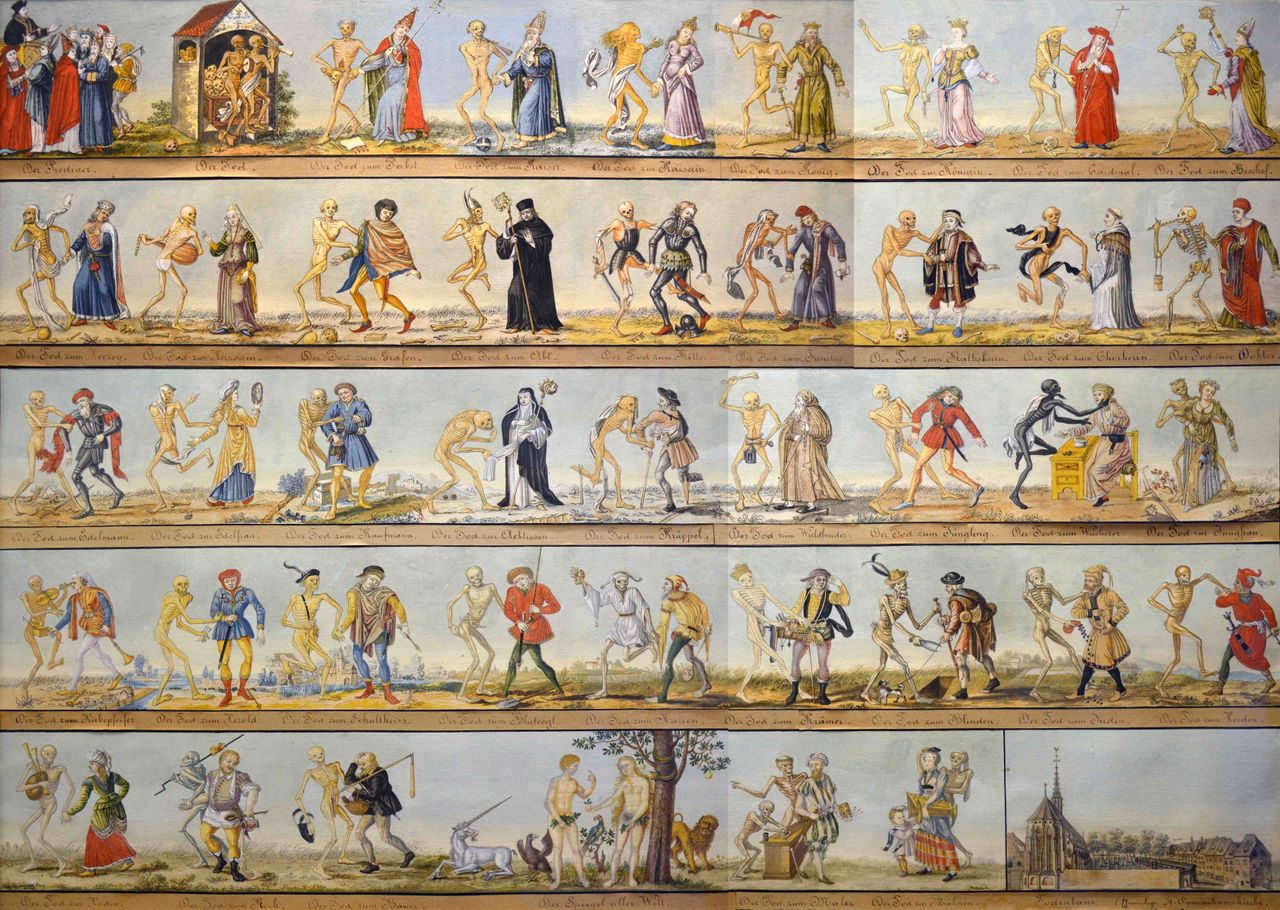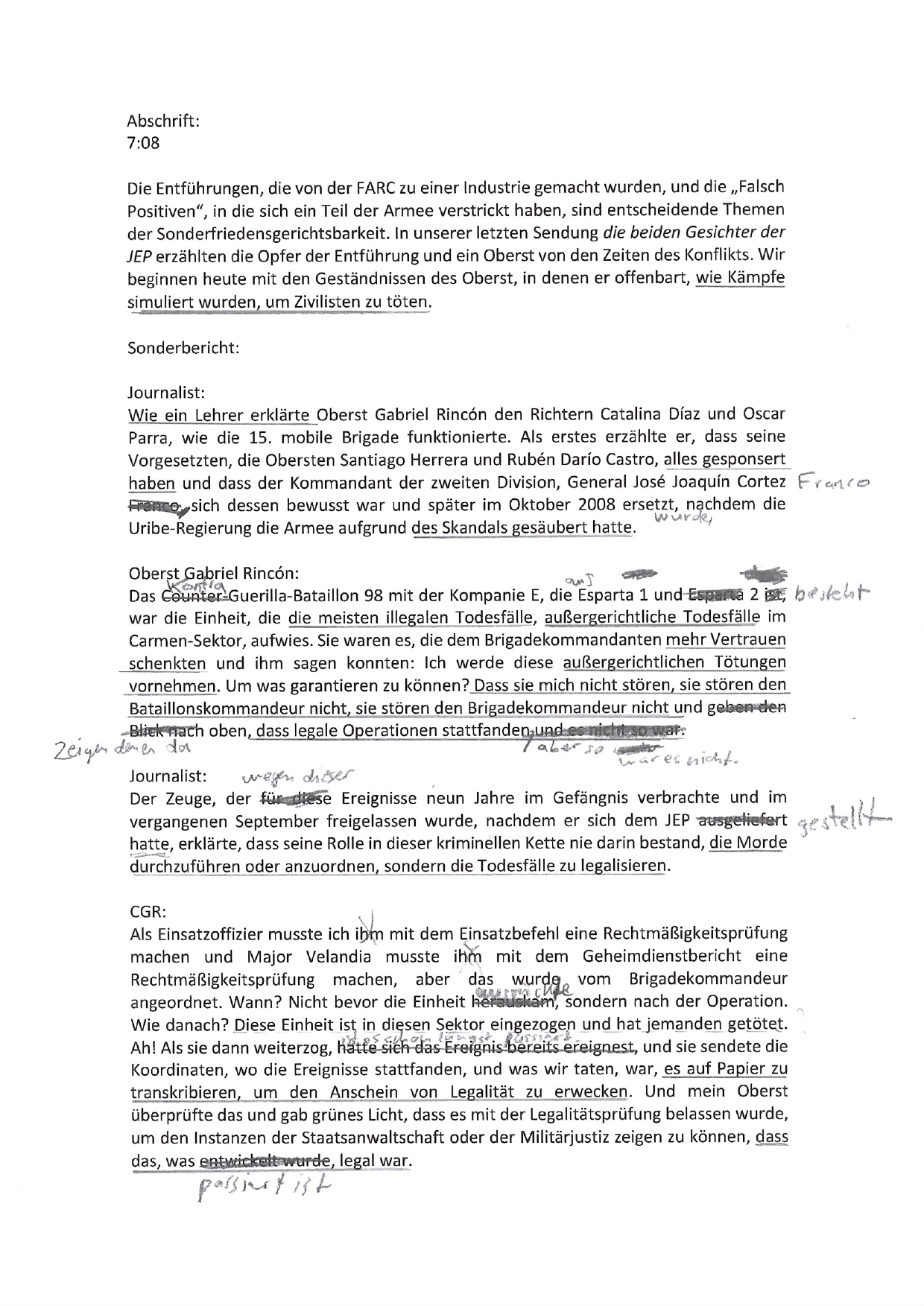
Aquarelle copy of the Basel Dance of Death from 1806 (Johann Rudolf Feyerabend)
Christian Andrés Rosales Fonseca. Vivos los queremos
For speaking electric guitar, electric guitar, soprano, loudspeaker orchestra and tape.
With his performance and sound installation the composer reappraises the bloody history of the civil war that has shaken his native country of Colombia to this day. One of the most horrifying systematic human rights violations was the targeted killing of civilians by national army forces which began in 2002 and lasted for six years. In order to meet the shooting quotas demanded by those in power the civilian victims were staged as successfully defeated guerrilla fighters. One encounters the abomination, the cynicism and the outrageous hypocrisy from the confession of a high-ranking general who was significantly involved in the crimes and who only confessed eleven years later. Rosales Fonseca sets a memorial to the victims by powerfully and relentlessly projecting the confession into the museum with the help of his speaking electric guitar and the electroacoustic music coming from the loudspeakers.
With Melissa Wedekind, Paul Zoder, Mattia Bonafini and the Bremen Loudspeaker Orchestra.

Translation of a reportage about False Positives broadcasted by Noticias Caracol on June 13, 2019.
"...THESE TWO WORLDS ON MY SKIN..."
EXCERPTS FROM A CONVERSATION BETWEEN CHRISTIAN ANDRÉS ROSALES FONSECA AND CHRISTOPH OGIERMANN ON MAY 9TH, 2022 IN THE OFFICE OF THE PROJEKTGRUPPE NEUE MUSIK (PGNM), BREMEN.
COMING HERE
Christian Andrés Rosales Fonseca (CRF): And then I came here and then "PAFFF", I really hit the wall.
(..) What I then (...) discovered is the very colonial way in which music is STILL seen here. It's a kind of post-colonialism, because the conventions of New Music HAVE to be like THIS: they have to be like THIS. But it is always from a European perspective (…).
Christoph Ogiermann (CO): To this day, this European culture behaves as though it were superior, and it is not only a cultural but also a massively social question, the question of the oppressed and the oppressors (and their representatives in the former colonies).
CRF: Or it's to be seen from below, not from above or always from the same perspective and it's about taking a different perspective or proposing a different perspective on how to make music or compose or how the world can be viewed.
CO: Frantz Fanon says that the only way is for the colonized to radically turn away from the colonial ways of thinking or power structures, Enrique Dussel, who tries to show this using European philosophy, Descartes and the following, such as the cogito, this ego, this strong European ego, which has also been legitimized by the philosophy of behaving in a superior manner. (...)
CRF: I want to answer these kinds of questions: how can I come up with more concrete methods to think about it in a totally different way? Well, I just read a book by Cesár Giraldo Herrera: Microbes and other Shamanic Beings. The point is that he talks about how the Europeans came to America. They installed something there, not just a regime, but a way of thinking: that’s the way it is, scientific things MUST be like this. (..) Now it’s about reappropriation, about taking back that which actually belongs to us and that it ALSO has to be an accepted way of viewing the world and that it also makes total sense. But because of this Western conception, our perspective was totally abolished. (...)
IDENTITY
CRF: (It) also has a lot to do with my depression and then also the vitiligo, which causes me to lose the colour of my skin. The skin cells can no longer produce colour. That also has a severe effect on my psychological well-being and I feel that with it I am also losing my identity. I was also very proud of my cinnamon-coloured skin, to be a mix of the people that we have in our country, of Africans, of indigenous people, also of Europeans. And now I'm becoming white! (...)
My mind is also being influenced by Western thoughts and my looks are also moving in that direction; my legs have completely lost their colour. In other places, the original colour is still fighting it. When I look at myself in the mirror and these white spots are getting bigger and bigger and at the same time my kind of identity, as I have always seen myself, is becoming less and less: this duality is also a part of me. And that's the same with the duality of the piece: I would say I composed a totally structured piece that is actually somewhat boring, a kind of soundscape playing in the background. But what's really important is the improvisation that comes on top of it. Because that's really what this duality is about: that's how I can represent this duality of losing my identity. And how do I compose something that also reflects this duality: something between New Music and the rhythmic elements and this musicality that I bring with me from Colombia, but they have to adapt to the New Music context. It's super difficult that I always have these two worlds, to experience the two worlds in my head and also on my skin.
IMPROVISATION CRF: And then there was what I found in the improvisation: this freedom (...). We have this beautiful word from Graciela Paraskevaídis: into the free sound, libres en el sonido, freedom in sound, or being free in sound, that also plays a big role. (...) You asked me: what would be an ideal performance situation for you? And that's when I’m in control of my fear and I'm free to listen, to notice what's happening and to react accordingly. Because when you're improvising, you're in it and at the same time you have to hear everything with big ears and react. (...)
CO: Nevertheless, playing electric guitar also has a therapeutic function for you.
CRF: Totally, yes.
DISSOCIATION/DEPERSONALIZATION/RE-ENACTMENT CRF: Dissociation, that's a behavioral reaction that you have when you've experienced trauma.
“Colombian society lives in a total state of dissociation. Dissociation happens because the person is engaged in an automatic activity and is not paying attention to his or her immediate environment. Dissociation can also occur during severe stress or trauma as a protective element whereby the individual incurs distortion of time, space, or identity. It doesn't matter if there were 6,402 false positives, or 262,197 deaths, or 8,708,664 victims. Deaths and human rights violations were normalized and simply became statistics. Society may have learned to separate itself from distress in order to survive. In turn it is immersed in a depersonalization—psychologically “leaving one’s body,” as if watching oneself from a distance as an observer or through derealization, leading to a sense that what is taking place is unfamiliar or is not real.” 1
There are these two reactions: dissociation and depersonalization. Dissociation is about: I hear the news and yet I go on with my life as usual and that is also a reaction to a trauma. It's very crazy how you can get used to something like that and that's why I use this kind of dissociation. And there's a third reaction that's happening, and that's also a behavioral reaction to a trauma, and that was my reaction too: and that's reenactment.
„A hallmark symptom of trauma is reexperiencing the trauma in various ways. Reexperiencing can occur through reenactments (literally, to “redo”), by which trauma survivors repetitively relive and recreate a past trauma in their present lives.” 2
And the concept you asked about has a lot to do with dissociation. It's about violence, it's about this scandal, with the whole history of the military killing civilians. But at the same time it's about the psychological reactions to the situation and how society reacted and how you react to trauma in the first place.
TITLE
CO: What does “Vivos los queremos” mean?
CRF: We want them alive. (...) It comes from a sentence: Vivos se los llevaron, vivos los queremos: they took them alive, we want them alive again ... back again, back but alive. (…) I saw this sentence during the protests in Colombia. In fact, this was exactly one year ago, on May 5th and everyone had to go home because the military was on the streets killing people. (laughs nervously)
PROPAGANDA CRF: I believe my intended message is being conveyed and that it also works on an emotional level.
CO: So you want to convey emotionalized information?
CRF: Hm. That's interesting because ... emotional information ... hm ... yeah, a bit, I think ... although the voice isn't emotional at all.
CO: What I'm getting at is that the music, in addition to the therapeutic work, which we just talked about, is also a symbolic work that you do (...). And there is a word for it that we use here and not only here and that’s called propaganda.
CRF: Oh (...) But propaganda is emotional, propaganda wants you to be afraid or have feelings like that. I didn't think so until you said that. It's actually counter-propaganda, but it's also my own propaganda. (...) I've also been called leftist, and red and stuff like communist: “Then go to Venezuela, try to live there.”
CO: (…) What about the piece is leftist?
CRF: That it's against the right. That's how it is seen in Colombia: if you're not right, you're left. (...)
CONTEXT CO: (...) What would change if you played this piece in Colombia?
CRF: Pfff, HUHU...lots of threats, it could get really dangerous. Could I do that at all? I might only be able to do so in a few specific contexts, but it would be very dangerous because I'm talking about things that aren't actually talked about so openly, especially in this context of right-wing extremism and especially in the election campaign with a so-called left against a so-called right. In Colombia the direction for the next four years is being decided on right now. The right exploits this: we will become like Venezuela and then the Russians will come. But I don't know if I could perform this piece in Colombia and I wouldn't actually try because of the fear. Not only fear for me, but also fear for my family. (...)
1 The quote is a mixture of a text by composer Rosales Fonseca and psychological terms, explained in Trauma-Informed Care in Behavioral Health Services. (2014). National Library of Medicine. 2 ibid